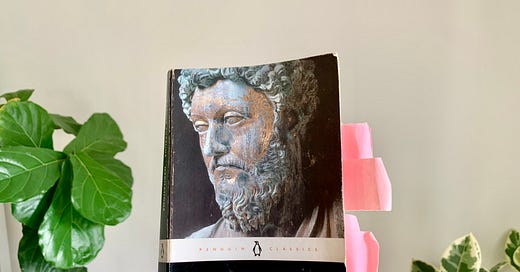19 life-changing Stoic lessons from Meditations by Marcus Aurelius
Wisdom from one of the last Great Emperors.
In a world obsessed with success, social status, achievement, and doing more, Stoic lessons can provide a much-needed reprieve.
Unsurprisingly, we’re more stressed, overwhelmed, anxious, and depressed than ever before. Something the pandemic hasn’t helped.
Calm, reason, presence, and virtue may be the necessary elements we’re lacking in our busy, always-on lives.
Meditations by Marcus Aurelius holds some of the key secrets to a well-lived life.
Honestly, there are few books I’d recommend as wholeheartedly as this one. Meditations may be the only book I own with as many dog-eared corners, post-it notes, and highlighted lines.
While this is one of the most popular philosophical texts ever written, the book wasn’t even written for public view. Marcus Aurelius wrote these musings to himself and as far as we’re aware, never intended to publish.
Meditations can be thought of as a unique insight into the thoughts of an emperor – said to be one of the last Five Good Emperors of Rome. Yet the words are just as applicable today as they were then.
These 19 lessons might even change your life.
1. Don’t take your time for granted
“You may leave this life at any moment: have this possibility in your mind in all that you do or say or think.”
Think you have the rest of your life to take that trip, start that business, or tell them you love them – well the truth is: life is not filled with guarantees. Acting on this assumption may lead you to take your time here for granted.
In reality, all we have is now and we must live with this in mind to truly make the most of it.
2. The future and past don’t exist
“No one can lose either the past or the future - how could anyone be deprived of what he does not possess.”
The human mind loves to live in the past replaying events (often negative) that have already happened. The mind also enjoys projecting into the future to plan, worry, and attempt to control things that haven’t happened – and may never happen.
Aurelius reminds us that the past and future do not exist – all that is real is happening now – in the present.
3. Life is but a temporary dream
“In man’s life his time is a mere instant, his existence a flux, his perception fogged, his whole bodily composition rotting, his mind a whirligig, his fortune unpredictable, his fame unclear. To put it shortly: all things of the body stream away like a river, all things of the mind are dreams and delusion…”
Deep down we know that life is impermanent, that all things are in a state of continual change, and that we, in this form, will not last forever. Yet, we live as though our ‘problems’ are permanent afflictions. We live as though we need to control the future – when really nothing is under our control.
To recognize our own impermanence in this world is the beginning of a new kind of intelligence and wisdom.
4. Waste no time thinking negatively of others
“Do not waste the remaining part of your life in thoughts about other people, when you are not thinking with reference to some aspect of the common good.”
Marcus Aurelius believed in virtue and goodness – and that extended to others as far as practical. Rather than spending time gossiping about others, why not focus on your life? In today’s world, where social comparison is exaggerated through social media, this lesson may be more essential than ever.
5. The real retreat is within
“No retreat offers someone more quiet and relaxation than that into his own mind, especially if he can dip into thoughts there which put him at immediate and complete ease… So constantly give yourself this retreat and renew yourself.”
In our hyper-busy world filled with technology addiction, hustle culture, and urbanization, many of us are interested in retreating physically. But the real retreat isn’t to the mountains or countryside. It’s within. Introspection, meditation, and mindfulness: these are the skills we need to awaken from the busyness of modern living.
6. Change is the only constant
“Constantly bring your mind all that you yourself have already seen changed. The universe is change: life is judgment.”
Humans love to cling to things. To people, to ideas, to status symbols, and to possessions. But, the truth is, the entire universe is subject to change. What is true today, is not necessarily true tomorrow. All is impermanent, and the more we can accept this, without judging things as good or bad, the lighter we will become as we go through our lives.
7. We are all one
“You have subsisted as a part of the Whole. You will vanish into that which gave you birth: or rather you will be changed, taken up into the generative principle of the universe.”
While we live in individualistic societies, really we are part of a greater whole. We are never really alone. We are not separate but connected to all that is.
8. Fame and praise are fickle
“One who is all in a flutter over his subsequent fame fails to imagine that all those who remember him will very soon be dead - and he too… As it is, you are losing the opportunity of that gift of nature which does not depend on another’s word.”
There’s no need to seek fame or praise, both are fickle and impermanent. Aurelius highlights the importance of not relying on what others believe of him. He recognizes that titles are soon lost. Riches cannot be taken with us. Ultimately, in this form, we will soon cease to be, so there is little worth in seeking recognition.
9. Learn to control your impulses
“No wandering. In every impulse, give what is right: in every thought, stick to what is certain.”
Our impulses lead us to seek prestige, strengthen our egos, and continue habits that are not serving us. If instead, we can recognize those impulses for what they are, we may act in ways that are for the common good.
10. Practice simplicity
“So in every case one should prompt oneself: ‘Is this, or is it not, something necessary?’ And the removal of the unnecessary should apply not only to actions but to thoughts also: then no redundant actions either will follow.”
If Aurelius were alive now, I’m confident he would have been a fan of minimalism. More importantly, though, mental minimalism. He believed wholeheartedly in the power of simplicity.
Perhaps we should continually ask ourselves, ‘Is this necessary?’ And watch our lives become increasingly less complex.
11. Others’ actions are not your issue
“Someone does you wrong? He does wrong to himself.”
Aurelius takes a pragmatic approach to the negative actions of others. While it’s easy to mull over wrongdoing and act out of frustration, he has a different approach.
Let others be as they are – when they do something to you, they’re really doing it to themselves.
12. Accept all as fated
“All that happens has been fated by the Whole from the beginning and spun for your own destiny. In sum, life is short: make your gain from the present moment with right reason and justice. Keep sober and relaxed.”
Life can be challenging, stressful, and overwhelming. But if we consider our personal lives as part of a bigger whole, it can provide much-needed perspective.
Thinking this way may help bring a sense of acceptance to things that may have happened in the past and a recognition that life can be simpler when viewed as less personal.
13. Death ought not to be feared
“And death is not only a function of nature, but also to her benefit.”
While it’s natural to fear the unknown, Marcus Aurelius considered death deeply. He recognized that death is part of nature and therefore not something to be feared, but something to be accepted - even appreciated.
14. Make the pursuit of mental freedom your true goal
“Your death will soon be on you: you are not yet clear-minded, or untroubled, or free from the fear of external harm, or kindly to all people, or convinced that justice of action is the only wisdom.”
For many of us, the mind’s pull is powerful. The mind tells us we need to be doing more, we need to be achieving greater things, or we need to find a new thrill from which to enjoy our lives. The mind is constantly with us critiquing, yearning, and wanting more and more from life.
The goal ought not to be more achievement, recognition, or riches, but to be clear-minded and to recognize the mind for what it is. The real journey is to clear the inner world so that the outer world can be accepted and appreciated for what it is.
15. You are not just a body
“You are a soul carrying a corpse, as Epictetus used to say.”
Aurelius didn’t appear to believe in a kind of oblivion after life. Instead, he recognized that he was more than a body and more than a mind – a soul carrying a corpse.
The question that remains then is, ‘Is there anything to really feel if we are to live this way?’
16. Accept that you are temporary
“So one should pass through this tiny fragment of time in turn with nature, and leave it gladly, as an olive might fall when ripe, blessing the earth which bore it and grateful to the tree which gave it growth.”
No one can escape the nature of life and death. None of us is permanent, yet we attempt to hide from this truth and distract ourselves from reality. If we could truly understand that life is temporary would we continue to worry about the smaller issues which will soon pass away? Can we live like nature does, accepting change and humbly knowing when it’s time to let go?
17. Be strong in your presence
“Be like the rocky headland on which the waves constantly break. It stands firm, and round it the seething waters are laid to rest.”
Life throws all kinds of events at us. Emotions run wild. A calm unwavering presence might seem hard to come by, but according to Aurelius that is what is necessary. One must stand firm as the emotions and events bubble around us.
18. All things vanish in time
“So in all this it must be folly for anyone to be puffed with ambition, racked with struggle, or indignant at his lot - as if this was anything lasting or likely to trouble him for long.”
A consistent theme of Aurelius’ is the changing nature of the universe. There’s no need to get attached to anything - even if we are not happy with our lot - for everything will soon be gone. All is temporary and accepting this can bring us a kind of deep peace.
19. One must live in the present
“He who sees the present has seen all thing, both all that has come to pass from everlasting and all that will be for eternity: all things are related and the same.”
While we live as though we are living in a continuum, really we are continually living in the same moment: the present. We can never be in the past, nor in the future - except in our minds. This kind of mental traveling causes all kinds of emotional upheaval and strife. Aurelius tells himself to live constantly in the present moment – for that is where all things exist. And that is where all peace can be found.
Hi 👋, I’m Chloe.
I write here and on Medium about books, philosophy, meditation, and mindfulness.
💻 Read previous posts
Why Bruce Lee said, “Be Like Water”
Every morning I complete a coastal hike near my home (pictured above). I watch the ocean from the National Park with its rolling waves, foaming breaks, and tidal churn. It’s the same ocean every day — yet it isn’t. It can never really be the same ocean, because there are always fluctuations. The water continually changes to accommodate nature…
Peaceful living: not treating life as something to be solved
As humans, we’re always looking to move on to the next level. A better job, a new partner, a more interesting city, or a more expensive car. Regardless of what it is, there’s always something we’re yearning for or working towards. There’s nothing necessarily wrong with setting goals and taking action in life. A problem arises, though, when life becomes s…
On taking life less seriously
As many of you know, I meditate every morning. It’s a practice I started to encourage a calmer mind. And it’s certainly had that effect on me. Often, though, something else happens: I’ll gain a kind of insight or epiphany. Recently, this happened. The mind is a kind of dream








Wise words indeed, a reminder to make the most of the fleeting moment we have in the context of infinite time.